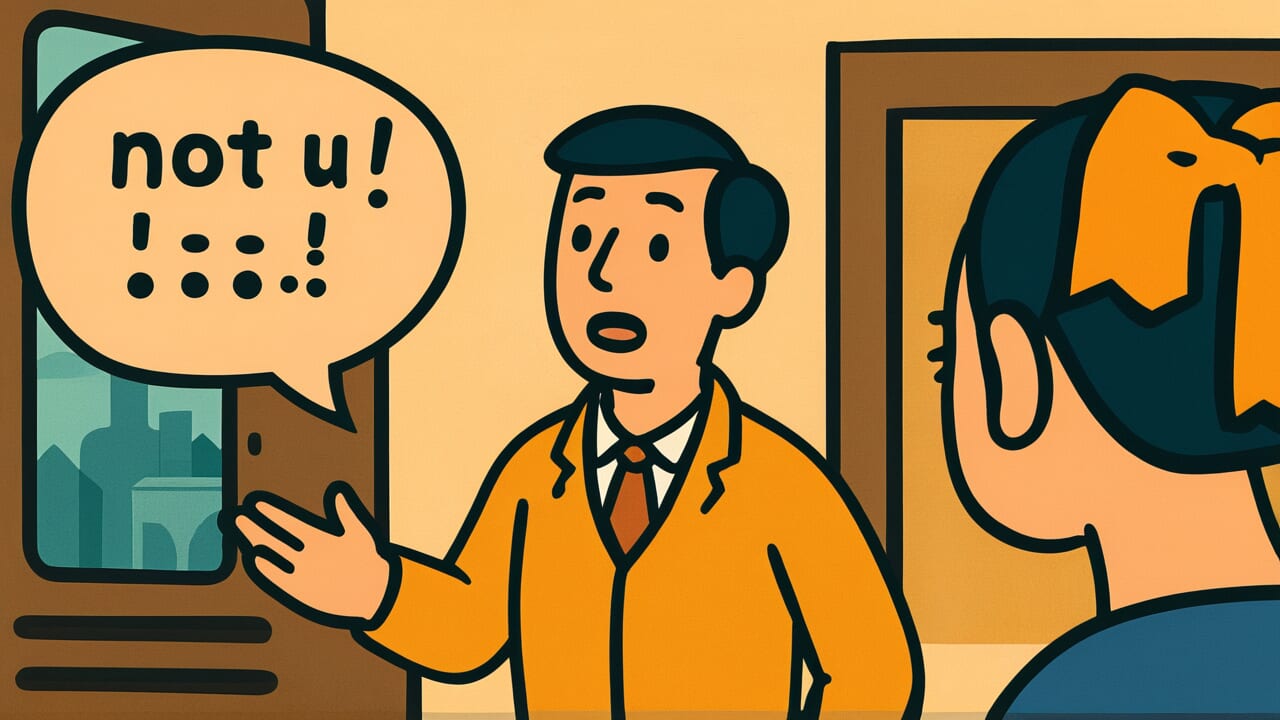How to Read “Others may not say it, but I won’t say it”
Hito wa iwanu ga ware iuna
Meaning of “Others may not say it, but I won’t say it”
This proverb warns you not to speak about matters that everyone around you is keeping quiet about.
It teaches the danger of carelessly saying out loud what others know but choose not to mention.
These might be sensitive topics that everyone tacitly avoids or secrets that people keep to themselves.
People use this saying when someone in a group is about to mention something delicate that everyone knows but no one discusses.
It serves as a warning to that person. You can also repeat it to yourself as a personal reminder to stay silent.
The reason this expression matters is simple. When others stay silent, they have good reasons.
They might be showing consideration, exercising restraint, or making a wise judgment. Their silence is a deliberate choice.
Even today, many situations at work or among friends require you to read the room and hold back your words.
This proverb captures the foolishness of being the only one who speaks up in such moments.
Origin and Etymology
No clear written records explain the origin of this proverb. However, the structure of the phrase offers interesting insights.
“Others may not say it, but I won’t say it” uses a parallel structure.
It contrasts “others may not say it” with “I won’t say it.” This creates a vivid comparison between what others do and what you should do.
This parallel structure appears often in didactic proverbs that spread among common people during the Edo period.
The background of this saying connects deeply to how people related to each other in Japanese village society.
In small communities, how you handled secrets and private information was crucial for maintaining trust.
If everyone kept quiet about something but one person spoke up, that person would lose the community’s trust.
Human relationships would crack and break.
The strong prohibitive form “I won’t say it” shows how seriously our ancestors took this teaching.
They chose this form not as mere advice but as a warning to engrave in your heart.
This proverb likely emerged from the combination of two ideas. First, the recognition that words can bring disaster.
Second, the cultural value of group harmony.
Usage Examples
- Everyone knows about that matter, but “others may not say it, but I won’t say it,” so I’ll keep quiet too
- Regarding his past, it’s a case of “others may not say it, but I won’t say it”—better not to bring it up
Universal Wisdom
“Others may not say it, but I won’t say it” reveals the power and meaning of silence in human society.
Why do people sometimes choose silence? Because speaking might hurt someone. Or because words might make a situation worse.
Silence is not a passive act. It’s an active form of consideration.
This proverb has endured because humans have a strong urge to talk about what they know.
The sense of superiority from knowing a secret. The feeling of connection from sharing information. Or simply having a loose tongue.
These traits remain constant across time. They’re part of human nature.
That’s why our ancestors put this warning into words and passed it down.
What’s fascinating is how this proverb contrasts “others” with “I.”
It recognizes the wisdom of others and warns against your own carelessness. This humility is the wisdom needed to live in a group.
Some people think they alone are right. They assume others stay silent because they don’t know.
This short phrase warns against such arrogance.
In human relationships, sometimes not speaking is the greatest kindness. Our ancestors understood this truth.
When AI Hears This
In an information network, when one person leaks a secret, it spreads in a doubling pattern: 2 people, 4 people, 8 people.
Mathematically, information spreads at an exponential rate.
If 10 people each tell 2 others in sequence, the information reaches 1,024 people in just 10 steps.
What matters here is how easily you can identify the source.
If 100 people already know a secret, finding who leaked it becomes nearly impossible.
But if you’re the first to speak, tracing the information trail leads directly back to you.
Information theory calls this low “information entropy.” It means low uncertainty and easy identification of the source.
When 99 other people stay silent, entropy is maximized. Finding the culprit becomes almost impossible.
But when you speak, entropy drops sharply. You alone become identifiable.
Even more interesting is how your position in the network affects your influence.
People near the center spread information faster. But they also stand out more as the source.
This proverb shows a strategy of placing yourself at the network’s edge. This helps you escape responsibility for spreading information.
When you blend into information that everyone knows, you become just one of countless transmitters.
The same principle works on modern social media.
Lessons for Today
This proverb teaches you the courage to pause before you post or speak.
With social media everywhere, you can always share something. You often feel the urge to share information you know right away.
But before you do, look around. Do others really want that information?
In modern society, information has become more valuable. But careless sharing can lead to irreversible consequences.
Workplace gossip, friends’ personal matters, family secrets. Even when you know these things, choosing not to speak makes you truly trustworthy.
This proverb teaches you the power of silence.
Saying everything is not the same as being honest. Sometimes staying quiet is the most considerate action you can take.
When others keep their mouths shut, they have reasons. Respect those reasons and act the same way.
This isn’t cowardice. It’s the judgment of a mature adult.
Once you speak words, you cannot take them back. That’s why you should develop the habit of thinking before you speak.



Comments